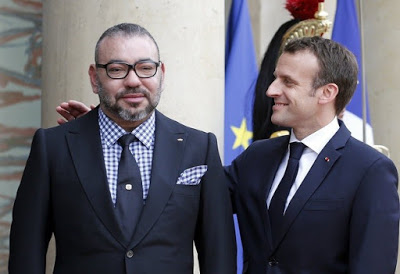Morocco, the preferred partner of a Europe obsessed with the risks of destabilisation
 |
| Pierre Vermeren – Khadija Mohsen-Finan 10/08/2019 |
In exchange for the kingdom’s “good conduct” on migrant issues or religious radicalism, the EU shows little regard for human rights in Morocco, say academics Khadija Mohsen-Finan and Pierre Vermeren, in an op-ed on “Le Monde”.
Tradotto da Eve Harguindey
Since 2011, apart from small Tunisia, which is trying to achieve democracy, Arab countries have been divided between those that have fallen into civil war and those that are distinguished by their inertia. Morocco claims to escape these classifications, highlighting the political “alternation” promoted by Hassan II since 1997-1998, which his son Mohammed VI had initially extended.
Hassan II (1929-1999) had been forced to open up the political system to correct the kingdom’s human rights image and join the nations that count on the international scene. But, despite the openings made, communication on change and the Moroccan “exception” has been more important than the change itself.
Refractory to any opening
In 2011, in response to the political and social demands of the “Arab Spring”, the government made a constitutional amendment at one go. The royal offer, welcomed by France and the European Union (EU), did not, however, change the system in place and was only marginally a response to the requests expressed by the Moroccans. The government pretended to close its negotiations with the “February 20” protesters, the protest movement whose members were subsequently co-opted by the regime for some or sentenced to prison for others. But the protests never stopped, regularly expressing themselves in the public space. The determination of the protesters in the Rif region in 2016-2017 helped to make the government febrile and resistant to any opening. In stages, the freedoms acquired in 1997-1998 seemed to be crumbling.
The offensive phase of Salafist terrorism, which began in Morocco in 2003, triggered a brutal reaction from the security apparatus, which was considered disproportionate. In 2011, the Palace acted strategically by offering government leadership to the Islamists of the Justice and Development Party (PJD). In this way, it hoped to undermine their credibility, as Hassan II had succeeded in doing ten years earlier with his historical left-wing enemies.
Also, during the 2010’s, the Palace’s responses to requests from Islamists, Berberists, trade unions, students, unemployed graduates, protesters from the Rif and the border province of Algeria, Sahrawis… were more and more often coercive. According to non-governmental organizations (Amnesty International and Human Rights Watch), the kingdom is once again home to hundreds of “political prisoners”, which the government denies by referring, as in the past, to “criminals” and “hooligans”. Has Morocco returned to its old system?
The change that was imposed on Hassan II twenty-five years ago is no longer the priority. As a privileged ally and security partner of Europeans and USAmericans, Morocco is no longer under any pressure to abandon its authoritarian governance. On sensitive issues, it has indeed made itself unavoidable. Thus, while some Maghreb States refuse the outsourcing, wanted by the European Union, of the management of migration flows, Morocco lends itself to the game.
Since Libya’s closure in 2017, Morocco, at the centre of migration, has often turned away sub-Saharan migrants trying to reach Europe with great violence. But moving them away from the Strait of Gibraltar towards the cities of southern Morocco, close to the Sahara, forces the kingdom to contort with the countries of the Sahel: because it wants at the same time to appear as a champion of Africa in solidarity with the fate of its migrants.
Morocco has also made itself “indispensable” in the fight against religious radicalism. The status of “Commander of the Faithful”, the king’s argument of authority over his people, has become the paragon of Islamic moderation with the endorsement of European governments. Morocco presents itself as a champion of an open Sunni Islam and Sufism and invests in the training of African and European imams: even a part of the French imams are now trained there. No one notices that the religious boiling of the kingdom has not yet fallen back.
Morocco’s “good conduct” on these issues or in the fight against terrorism comes at a price. The European Union and Western countries have very little regard for human rights and the regime’s very slow progress towards democracy. Their priority is elsewhere. The European Commission, for example, has had no qualms about ignoring the opinion of the European Court of Justice. The Court ruled that the fisheries agreement between the EU and Morocco could not apply to Western Sahara, since this territory is not linked to Morocco under international law.
Unenforceable clause
Despite this, the renegotiated agreement was signed in Rabat on 24 July 2018, including a clause that seems totally inapplicable. The Sahrawis, referred to in this text as “inhabitants of the area”, are supposed to benefit from the sums received by Morocco from the sale of fish resources from the waters of the Sahara. Thus, the renegotiated agreement continued to favour Morocco, but also the EU, allowing its vessels to access these fishing grounds for €52 million per year, 30% more than under the previous text. As for migration control, it was the subject of a transaction of 148 million paid to Morocco for the year 2018 alone.
The European Union and its Mediterranean countries no longer make liberalisation and political transition a prerequisite in this region of the world. Obsessed with what they perceive as risks of destabilization, they prefer to have reliable and strong interlocutors. In this game, the Kingdom of Morocco is the most desirable partner.


